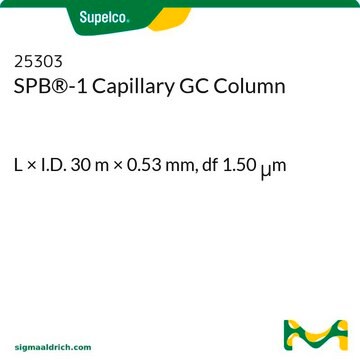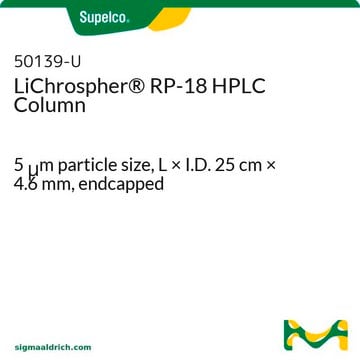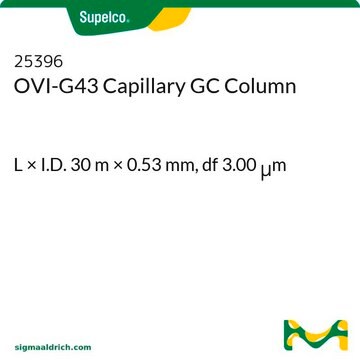24205-U
VOCOL® Capillary GC Column
L × I.D. 30 m × 0.25 mm, df 1.50 μm
Synonym(s):
FS CAP VOCOL® 30M .25MM 1.5UM
About This Item
Recommended Products
material
fused silica
Agency
EPA TO-17,502.2,624,8015,8260,OLM04.2 VOA,524.2
NIOSH 1003
suitable for EPA 601
parameter
≤25-250 °C temperature (isothermal or programmed)
Beta value
42
df
1.50 μm
technique(s)
gas chromatography (GC): suitable
L × I.D.
30 m × 0.25 mm
application(s)
environmental
food and beverages
forensics and toxicology
industrial hygiene
column type
capillary intermediate polar
Looking for similar products? Visit Product Comparison Guide
General description
USP Code: None
Phase:
- Bonded
- Proprietary
- ≤0.32 mm I.D., <2 μm: Subambient to 250 °C (isothermal or programmed)
- ≤0.32 mm I.D., ≥2 μm: Subambient to 230 °C (isothermal or programmed)
- ≥0.53 mm I.D., <2 μm: Subambient to 250 °C (isothermal or programmed)
- ≥0.53 mm I.D., ≥2 μm: Subambient to 230 °C (isothermal or programmed)
Application
Other Notes
Legal Information
Choose from one of the most recent versions:
Already Own This Product?
Find documentation for the products that you have recently purchased in the Document Library.
Customers Also Viewed
Articles
HS-SPME with Carboxen®/PDMS coated Nitinol fiber allows low MW analyte detection in light-exposed milk plastics.
HS-SPME with Carboxen®/PDMS coated Nitinol fiber allows low MW analyte detection in light-exposed milk plastics.
HS-SPME with Carboxen®/PDMS coated Nitinol fiber allows low MW analyte detection in light-exposed milk plastics.
HS-SPME with Carboxen®/PDMS coated Nitinol fiber allows low MW analyte detection in light-exposed milk plastics.
Protocols
In this article, SPME-GC was successfully used to identify many volatile compounds present in the headspace over several spirits.
There are three types of analyses: GRO, DRO, and TPH. The published methods are simply variations of these to meet the different analytical needs of the individual agencies.
There are three types of analyses: GRO, DRO, and TPH. The published methods are simply variations of these to meet the different analytical needs of the individual agencies.
There are three types of analyses: GRO, DRO, and TPH. The published methods are simply variations of these to meet the different analytical needs of the individual agencies.
Related Content
This page is intended to make it easier to find the consumables you need based on the analytical method you’re using. Methods included on this page come from the EPA, Standard Methods and ASTM.
Chromatograms
suitable for GCsuitable for GC, application for SPMEsuitable for GC, application for SPMEsuitable for GCOur team of scientists has experience in all areas of research including Life Science, Material Science, Chemical Synthesis, Chromatography, Analytical and many others.
Contact Technical Service











